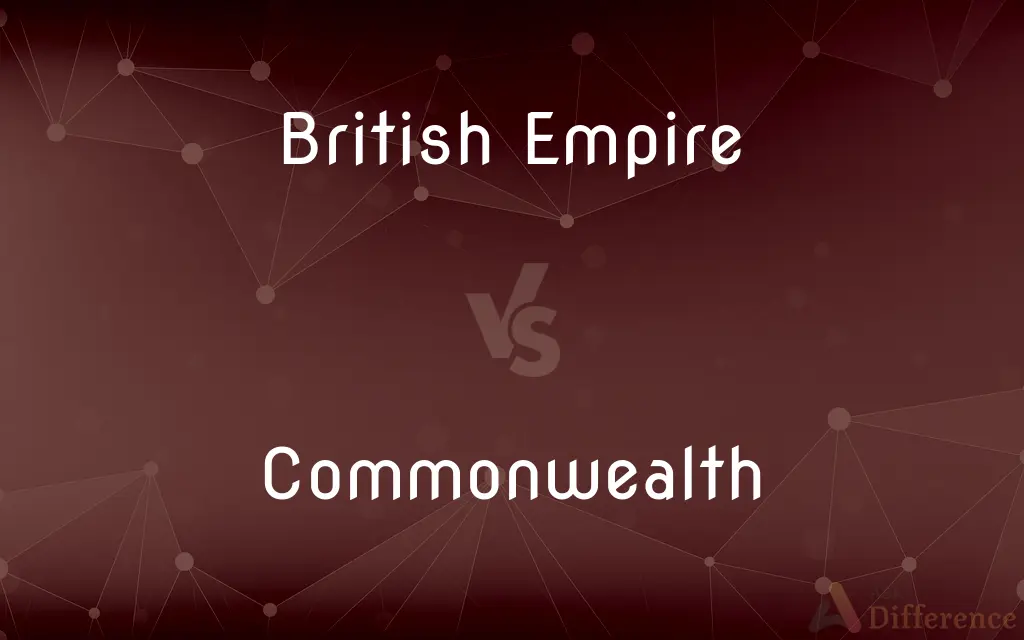British Empire vs. Commonwealth — What's the Difference?
By Tayyaba Rehman — Published on January 31, 2024
The British Empire was a global system of territories ruled by Britain, whereas the Commonwealth is a voluntary association of independent countries, many of which were former British colonies.

Difference Between British Empire and Commonwealth
Table of Contents
ADVERTISEMENT
Key Differences
The British Empire, at its height, was the largest empire in history, encompassing territories on every continent. It was characterized by British colonial rule and governance. In contrast, the Commonwealth is a political association of countries, most of which are former territories of the Empire, that cooperate on mutual interests without any political power held by Britain.
The British Empire was built on colonial expansion, often through military conquest and economic control. It played a major role in global trade, politics, and culture from the 16th to the 20th century. The Commonwealth, established in the mid-20th century, signifies a shift from colonial rule to independent nationhood, emphasizing equality and voluntary cooperation among its members.
Governance within the British Empire was centralized, with the British government exerting control over colonies. This often led to exploitation and suppression of local cultures. The Commonwealth, in contrast, operates on a consensus-based model, promoting democracy, human rights, and sustainable development among its member states.
The British Empire was a symbol of British dominance and power, influencing global geopolitics. The Commonwealth, however, represents a collaborative network, fostering international relationships and cultural exchanges between its members, which include both republics and monarchies.
The legacy of the British Empire is complex, marked by both development and exploitation. The Commonwealth seeks to address some of these historical issues, promoting peace and reconciliation among nations that share a colonial past.
ADVERTISEMENT
Comparison Chart
Nature
Colonial empire
Voluntary association
Governance
Centralized British control
Independent, cooperative governance
Historical Period
16th to mid-20th century
Established mid-20th century onwards
Relationship with Britain
Colonies under British rule
Equal members, independent of Britain
Purpose
Expansion, trade, and power projection
Mutual cooperation, cultural exchange
Compare with Definitions
British Empire
A vast maritime empire ruled by Britain, characterized by extensive colonization.
The sun never set on the British Empire, reflecting its global reach.
Commonwealth
An international organization of countries, mostly former British colonies, promoting cooperation.
India is a member of the Commonwealth, highlighting its post-colonial ties with Britain.
British Empire
An empire that underwent phases of expansion, consolidation, and eventual decolonization.
The decline of the British Empire followed World War II, leading to the independence of many countries.
Commonwealth
A symbol of the transition from colonial rule to independent nationhood and cooperation.
The Commonwealth represents the evolution of Britain's relationship with its former colonies.
British Empire
A historical period marked by British global dominance and territorial control.
The British Empire played a significant role in shaping modern world history.
Commonwealth
A political and cultural association emphasizing shared values and equal partnership.
The Commonwealth Games symbolize the camaraderie and sporting spirit of its member nations.
British Empire
A system of governance where Britain administered and exploited overseas territories.
The British Empire's colonies provided valuable resources for Britain's industrial growth.
Commonwealth
An entity fostering economic and educational ties among member countries.
The Commonwealth scholarships enhance academic exchanges among its member states.
British Empire
An empire known for its influence on international trade, politics, and culture.
The British Empire's legacy is evident in the widespread use of the English language.
Commonwealth
The people of a nation or state; the body politic.
Commonwealth
A nation or state governed by the people; a republic.
Commonwealth
Used to refer to some US states, namely, Kentucky, Massachusetts, Pennsylvania, and Virginia.
Commonwealth
Used to refer to a self-governing, autonomous political unit voluntarily associated with the United States, namely, Puerto Rico and the Northern Mariana Islands.
Commonwealth
Often Commonwealth The Commonwealth of Nations.
Commonwealth
The English state and government from the death of Charles I in 1649 to the restoration of the monarchy in 1660, including the Protectorate of 1653 to 1659.
Commonwealth
(Archaic) The public good; commonweal.
Commonwealth
The well-being of a community.
Commonwealth
The entirety of a (secular) society, a polity, a state.
Commonwealth
Republic. Often capitalized, as Commonwealth.
Commonwealth
A state; a body politic consisting of a certain number of men, united, by compact or tacit agreement, under one form of government and system of laws.
The trappings of a monarchy would set up an ordinary commonwealth.
Commonwealth
The whole body of people in a state; the public.
Commonwealth
Specifically, the form of government established on the death of Charles I., in 1649, which existed under Oliver Cromwell and his son Richard, ending with the abdication of the latter in 1659.
Commonwealth
The official name of some states in the United States (Massachusetts and Pennsylvania and Virginia and Kentucky) and associated territories (Puerto Rico)
Commonwealth
A politically organized body of people under a single government;
The state has elected a new president
African nations
Students who had come to the nation's capitol
The country's largest manufacturer
An industrialized land
Commonwealth
A world organization of autonomous states that are united in allegiance to a central power but are not subordinate to it or to one another
Commonwealth
A political system in which the supreme power lies in a body of citizens who can elect people to represent them
Commonwealth
A voluntary union of sovereign states consulting and coordinating on mutual interests.
The Commonwealth meetings provide a platform for discussing global issues collaboratively.
Common Curiosities
What are the aims of the Commonwealth?
To promote democracy, human rights, economic development, and cultural exchange among member states.
How did the British Empire impact the world?
It significantly influenced global politics, trade, and culture, but also involved exploitation and colonization.
When did the British Empire reach its peak?
In the late 19th and early 20th centuries, covering about a quarter of the world's land area.
What is the Commonwealth?
A political association of independent countries, many former British colonies, cooperating on mutual interests.
How does the Commonwealth benefit its members?
Through economic cooperation, cultural exchanges, educational opportunities, and diplomatic support.
What is the role of the British monarch in the Commonwealth?
The monarch is the symbolic head of the Commonwealth but has no governing authority over member states.
What was the British Empire?
A global empire controlled by Britain, known for its extensive colonization.
Was the British Empire beneficial or harmful to its colonies?
Views are mixed; while it brought some development, it also involved exploitation, cultural suppression, and conflict.
How does the Commonwealth maintain its relevance today?
By addressing contemporary global challenges and promoting shared values among its diverse membership.
What led to the decline of the British Empire?
Factors include World War II, rising nationalism in colonies, and changing global attitudes towards imperialism.
What was the economic impact of the British Empire?
It facilitated global trade but also involved exploitation of colonial resources for Britain's benefit.
Does the Commonwealth have any political power?
No, it operates on consensus and does not have legislative or executive power over its members.
Can countries join the Commonwealth without having been British colonies?
Yes, countries with no historical ties to the British Empire can join, provided they adhere to Commonwealth values.
How did the British Empire influence global culture?
It spread the English language, legal systems, and cultural practices, while also impacting local cultures.
How do Commonwealth countries interact with each other?
Through diplomatic channels, summits, cultural events, and initiatives like the Commonwealth Games.
Share Your Discovery

Previous Comparison
Albinism vs. Leucism
Next Comparison
Final in Java vs. Finally in JavaAuthor Spotlight
Written by
Tayyaba RehmanTayyaba Rehman is a distinguished writer, currently serving as a primary contributor to askdifference.com. As a researcher in semantics and etymology, Tayyaba's passion for the complexity of languages and their distinctions has found a perfect home on the platform. Tayyaba delves into the intricacies of language, distinguishing between commonly confused words and phrases, thereby providing clarity for readers worldwide.
















































